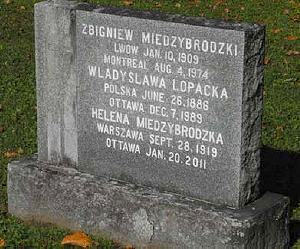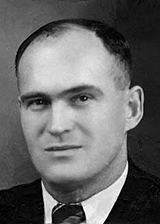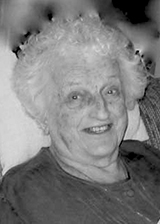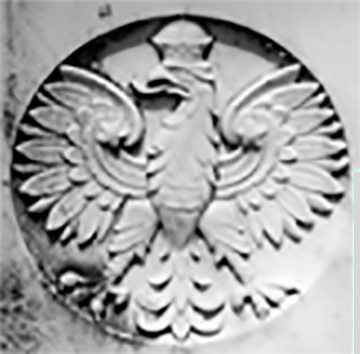Grave of the Międzybrodzki family

[lot C1 695 ]
previous | next
select grave #

Władysława ŁOPACKA
( 1886-1989 )
( 1886-1989 )
Born in Poland. Mother of Helena (below). After the German invasion of Poland in 1939, her husband Tadeusz Lopacki was executed by the Gestapo and her son Wladyslaw perished in the concentration camp of Mauthausen. Her second son, Tadeusz, was killed during the Warsaw Uprising in 1944. She and her daughter Helena were deported to the Auschwitz concentration camp, thence to Ravensbruck and Oranienbourg. After Liberation, the two women reached Sweden, while a second daughter, Marta, remained in Poland. In 1951, Wladyslawa emigrated to Canada with Helena and her husband and lived with them in Montreal. She died in Ottawa at age 103.

Zbigniew MIĘDZYBRODZKI
( 1909-1974 )
( 1909-1974 )
Born in Lwow, graduated as a naval engineer from the Gdansk Polytechnic, in 1938-1939 worked in the shipyards of the Polish Navy. When Germany invaded Poland in September 1939, fought in the defence of Hel, shortly thereafter was arrested by the Nazis and sent to the concentration camps of Stutthof, then Sachsenhausen. Liberated in 1945 by the United-States forces. Married Helena Lopacka (below), together they moved to Sweden where Zbigniew worked as an engineer in the Gävlo shipyards. Was actively involved in aiding Polish refugees. The family emigrated to Canada in 1951. Zbigniew worked for Canadian Vickers Shipyards and Canadian Industries LTD Central Research until 1972 when his failing health, compromised by ill treatment during the war, forced him to take early retirement. He died at 65, mourned by his wife Helena and their children, Tadeusz and Krystyna.

Helena MIĘDZYBRODZKA
( 1919-2011 )
( 1919-2011 )
Born in Warsaw, daughter of Wladyslawa (above) and of Tadeusz Lopacki, Helena completed her studies in commerce and worked in the Polish Savings Bank until the German occupation in 1939 when her father was executed by the Germans. Thereafter Helena worked in a printing office, while also taking part in the underground resistance and in the 1944 Warsaw Uprising. In September 1944 the Germans took Helena, her brother and their mother Wladyslawa (above) from their bombed-out cellar to Auschwitz. There was no room for the women at the camp so they slept outdoors and after a few days were taken to the Sachsenhausen concentration camp. While there, Helena was assigned to work at the Pertrix Battery Factory in Schoneweide. She worked 12-hour shifts day and night, often working double shifts to replace her mother who was too weak to endure the hardship. In April 1945 all those at the camp were ordered to march north towards the sea. After two weeks of walking, they were liberated by Allied soldiers, among them a regiment from Manitoba.
In 1945 Helena Married Zbigniew Miedzybrodzki (above), a fellow-prisoner of the concentration camps. Thanks to the Swedish Bernadotte medical-health program in aid of former victims of German camps, Helena and her mother were treated in Sweden and after a year of convalescence joined Zbigniew in Gävle. In 1951, the family emigrated to Canada, settling in Montreal. The first years were very hard, Helena found physical work to cope with the family finances. After several years, she learned enough English and French to get a job as a salesclerk at Simpson’s department store. She worked there until she took early retirement to take care of her aging mother, and subsequently of her growing family. She died at age 92.
In 1945 Helena Married Zbigniew Miedzybrodzki (above), a fellow-prisoner of the concentration camps. Thanks to the Swedish Bernadotte medical-health program in aid of former victims of German camps, Helena and her mother were treated in Sweden and after a year of convalescence joined Zbigniew in Gävle. In 1951, the family emigrated to Canada, settling in Montreal. The first years were very hard, Helena found physical work to cope with the family finances. After several years, she learned enough English and French to get a job as a salesclerk at Simpson’s department store. She worked there until she took early retirement to take care of her aging mother, and subsequently of her growing family. She died at age 92.
